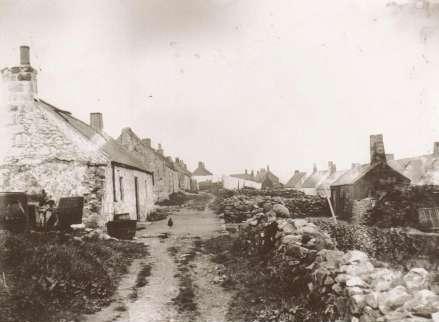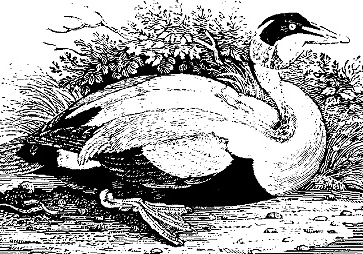
Eider Duck |
The Eider Ė a particularly smelly duck under certain circumstances (see further below). These ducks were a common sight along our coastline for a long time although numbers appear to have diminished somewhat over recent years.
 The
Common Eider is characterized by its bulky shape and large wedge-shaped
bill. The male is unmistakable with its black and white plumage and
green nape although this plumage will change after the breeding season
and it becomes difficult to tell the difference between male and female
birds. The female is a brown bird, but can still be readily
distinguished from all ducks, except other eider-species, on the basis
of size and head shape. You can tell you are in the vicinity of an Eider
Duck by their distinctive "ah-ooo" call.
The
Common Eider is characterized by its bulky shape and large wedge-shaped
bill. The male is unmistakable with its black and white plumage and
green nape although this plumage will change after the breeding season
and it becomes difficult to tell the difference between male and female
birds. The female is a brown bird, but can still be readily
distinguished from all ducks, except other eider-species, on the basis
of size and head shape. You can tell you are in the vicinity of an Eider
Duck by their distinctive "ah-ooo" call.
The Eider's nest is built close to the sea and is lined with the celebrated eiderdown, plucked from the female's breast. This soft and warm lining has long been harvested for filling pillows and quilts.
In the 1970ís and 1980ís it was very common to walk along the foreshore between Portlethen and Downies and find an Eider sitting on a nest of eggs (they can lay up to ten eggs). In fact we usually discovered at least half a dozen nest sites in this area every breeding season.
These ducks donít scare very easily and usually remain sitting on their nest until the last possible minute and because of the camouflaged nature of their plumage you could easily stumble upon them without having seen them. When that happens look out! The duck will suddenly take flight without warning and head straight for the sea and in doing so would squirt a nasty stream of excrement over its eggs, should you happen to be in the path of the escape route then the chances are you would be sharing some of this spray with the eggs. The smell is very unpleasant and Iím assuming that this is done to discourage any potential predators from taking the eggs.
 We were always aware that Eider Duck eggs were legally
protected so unlike the Herring Gull eggs, which were collected, the
duck eggs always remained in the nests.
We were always aware that Eider Duck eggs were legally
protected so unlike the Herring Gull eggs, which were collected, the
duck eggs always remained in the nests.
There are still Eider Ducks seen in the area but the groups are much smaller nowadays and I believe that itís probably six or seven years since I last saw a group of ducks swimming on the sea accompanied by any of their young.
I suspect that there are probably more predators skulking around the rocks and cliffs these days, the fox has always been a common sight and within the last two years Iíve frequently encountered rats and stoats down near the waters edge when Iíve been doing my creels. I suspect that these are the likely culprits in respect to egg stealing and the Eider Duck appears to have suffered more than most. Mink used to be another predatory animal that you would occasionally encounter on the rocks or shores although itís many years now since I last saw one of those.